牛津英汉双解大词典The New Oxford Dictionary of English(Z)
李微微--基于语料库的汉英介词对比研究
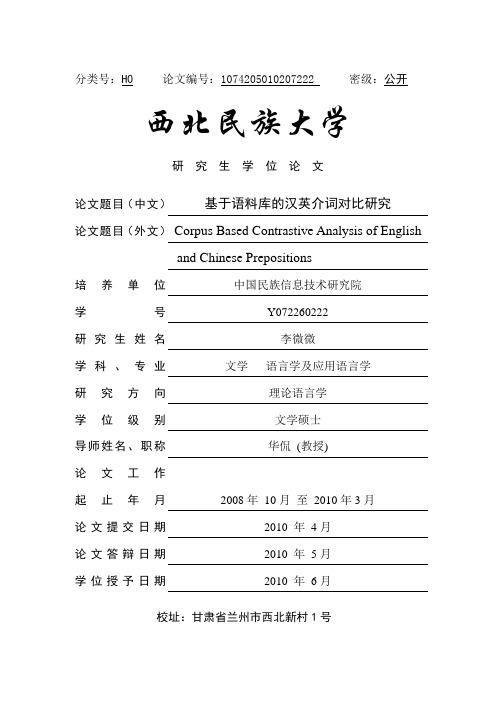
分类号:H0论文编号:1074205010207222 密级:公开西北民族大学研究生学位论文论文题目(中文)基于语料库的汉英介词对比研究论文题目(外文)Corpus Based Contrastive Analysis of Englishand Chinese Prepositions培养单位中国民族信息技术研究院学号Y072260222研究生姓名李微微学科、专业文学语言学及应用语言学研究方向理论语言学学位级别文学硕士导师姓名、职称华侃(教授)论文工作起止年月2008年10月至2010年3月论文提交日期2010 年4月论文答辩日期2010 年5月学位授予日期2010 年6月校址:甘肃省兰州市西北新村1号基于语料库的汉英介词对比研究中文摘要英语和现代汉语都是分析性语言,但二者的语言系统差异还是很大的。
介词作为这两种语言中都存在的一类词,在各自的语言中地位都比较特殊,用法也比较复杂。
虽然英语和现代汉语中的介词都是封闭类词汇,但在这两种语言中,介词都有存在争议或不容易掌握的地方。
比如,汉语一些介词的来源的界定、部分介词的可省略问题、一些介词虚化程度的认定、“框式介词”的后部词的词性的界定,英语边缘介词的认定。
由汉语介词“把”、“被”或“比”形成的特殊句式不但打破了以往主谓宾的语序,对补语、否定成分等其它句法成分的顺序也有影响。
受所接词的音节数、语体色彩、习惯用法等因素影响的同义介词的互换问题,也是汉语介词学习过程中容易造成困惑的地方。
而对于英语介词而言,其动词性强、使用的强制性的特点,直接影响到我们进行英汉互译方法的使用。
英语介词的多义性也是我们学习和使用的难点。
本论题属对比语言学汉英、英汉双向对比。
在两种语言对比的过程中,我们在介词出现词频、介词数量、分布特点等方面的考察时使用语料进行统计,根据语言事实得出结论。
并用菲尔墨的深层语义格理论对两种语言中的介词进行对比,通过权威的英汉词典的例句的分析佐证,得出两种语言中常用介词基于深层语义格的对应关系。
[宝典]《牛津高阶英汉双解词典》的语法性研究文献综述
![[宝典]《牛津高阶英汉双解词典》的语法性研究文献综述](https://img.taocdn.com/s3/m/d9c0fd7e001ca300a6c30c22590102020640f258.png)
《牛津高阶英汉双解词典》的语法性研究文献综述一、该选题的国内外研究现状《牛津高阶英汉双解词典》的语法性研究与分析对于词典的编纂提供了很好的向导,也对英语学习者对英语的学习带来了帮助。
英语词典吸收了新的语言学理论,出现了许多新的释义方式,词典编纂者应时刻掌握使用者需求动态与认知习惯要求,编纂出更适合需求的词典。
(一)国外研究现状早在二十世纪七十年代,Hornby A S于1978发表了“Longman Dictionary of Contemporary English-The complete Guide to Written and Spoken English ”的文章,从而对词典的研究打开了序幕,将词典的功能扩大化、细致化。
《牛津高阶》是历史悠久的字典,许多字典的标准是由它所建立,可以称为字典的大哥大。
针对读者学习需求,不收古语、罕语,也不收字源。
以国际音[IPA]为准,兼收英国音和美国英;英文定义简明;例句丰富;动词分及物和不及物,名词分可数和不可数。
作为ESL词典的开山鼻祖,OALD确立了很多词典编写的标准,这些标准广泛的被其他出版社采用。
OALD也一直把发行量第一作为广告来宣传自己。
A.P.Cowie于2002年发表的一篇论文名为“English Dictionaries for Foreign Learners: A History”也描述了英语词典对于外国学习者在学习英语的过程中所起到的作用,并且对其历史也作了详细的研究。
同年,Rundel L.M. 也发表了一篇名为“Macmillan English Dictionary for Advanced Learners”的论文,他主要是针对一些进阶的学习者做的一些研究,他是用麦克米伦英语词典来作为研究对象,旨在通过对麦克米伦词典的研究来达到研究出增进人们学习英语的最佳途径以及编辑英语词典的方法等等。
(二)国内研究现状人类社会在经济、文化、科技等方面的发展已经进入了一个飞速更新的局面。
双解词典对应词的翻译
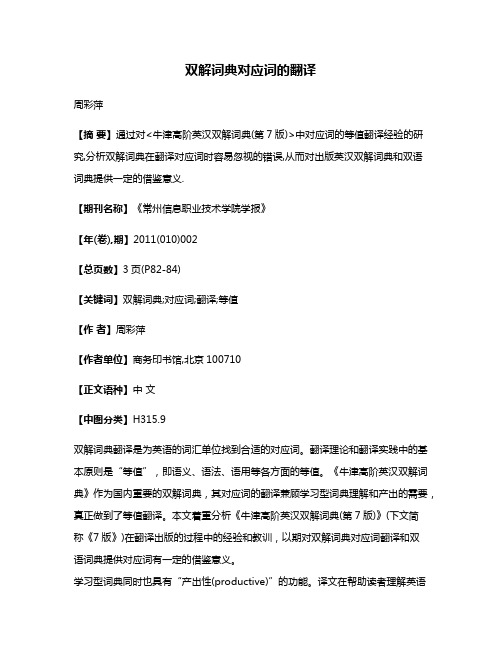
双解词典对应词的翻译周彩萍【摘要】通过对<牛津高阶英汉双解词典(第7版)>中对应词的等值翻译经验的研究,分析双解词典在翻译对应词时容易忽视的错误,从而对出版英汉双解词典和双语词典提供一定的借鉴意义.【期刊名称】《常州信息职业技术学院学报》【年(卷),期】2011(010)002【总页数】3页(P82-84)【关键词】双解词典;对应词;翻译;等值【作者】周彩萍【作者单位】商务印书馆,北京100710【正文语种】中文【中图分类】H315.9双解词典翻译是为英语的词汇单位找到合适的对应词。
翻译理论和翻译实践中的基本原则是“等值”,即语义、语法、语用等各方面的等值。
《牛津高阶英汉双解词典》作为国内重要的双解词典,其对应词的翻译兼顾学习型词典理解和产出的需要,真正做到了等值翻译。
本文着重分析《牛津高阶英汉双解词典(第7版)》(下文简称《7版》)在翻译出版的过程中的经验和教训,以期对双解词典对应词翻译和双语词典提供对应词有一定的借鉴意义。
学习型词典同时也具有“产出性(productive)”的功能。
译文在帮助读者理解英语原文的同时,也需要帮助读者学会如何使用该语义单位。
对应词若补足了语法信息,不光能帮助读者进一步理解义项,还能帮助读者了解如何使用该语言单位。
因此在翻译单词的释义,提供对应词时也应照顾到语法信息。
一般来说不将名词译作形容词、形容词译作副词是最基本的要求,在翻译实践的过程中容易实现。
更高层次的要求,如根据英文释义,在对应词中提供搭配信息。
搭配信息对于学习型词典来说尤其重要,这类信息全面的对应词是对英语释义的有益补充,可以进一步帮助读者理解和掌握地道的语言。
《7版》正是考虑到这一点,尤其注意从这一方面提高对应词的“等值”效应。
由于英汉语言的差异,英语动词习惯搭配的宾语与汉语中对应的动词习惯搭配的宾语常常不一致。
在翻译及物动词时,尤其要注意不受汉语习惯的影响,把英语动词所搭配的准确宾语放在括号中。
牛津高级英语双解词典 牛津高阶英语词典
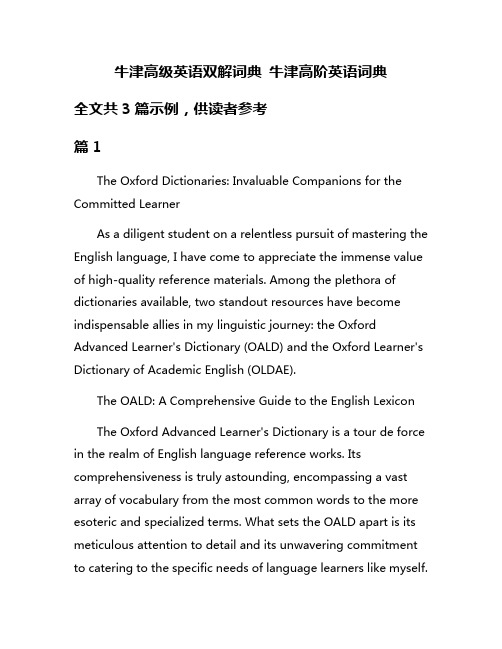
牛津高级英语双解词典牛津高阶英语词典全文共3篇示例,供读者参考篇1The Oxford Dictionaries: Invaluable Companions for the Committed LearnerAs a diligent student on a relentless pursuit of mastering the English language, I have come to appreciate the immense value of high-quality reference materials. Among the plethora of dictionaries available, two standout resources have become indispensable allies in my linguistic journey: the Oxford Advanced Learner's Dictionary (OALD) and the Oxford Learner's Dictionary of Academic English (OLDAE).The OALD: A Comprehensive Guide to the English LexiconThe Oxford Advanced Learner's Dictionary is a tour de force in the realm of English language reference works. Its comprehensiveness is truly astounding, encompassing a vast array of vocabulary from the most common words to the more esoteric and specialized terms. What sets the OALD apart is its meticulous attention to detail and its unwavering commitment to catering to the specific needs of language learners like myself.One of the standout features of the OALD is its clear and concise definitions. Each entry is meticulously crafted to provide precise explanations, ensuring that even the most nuanced shades of meaning are captured. The dictionary excels at elucidating the contextual usage of words, offering a wealth of illustrative examples that bring the definitions to life. This approach has proven invaluable in solidifying my understanding of how words are employed in real-world scenarios.Another aspect that I find particularly useful is the OALD's extensive treatment of phrasal verbs and idioms. These linguistic constructs, which can often perplex even advanced learners, are presented in a manner that is both thorough and accessible. The dictionary not only defines these expressions but also provides valuable insights into their origins, register, and appropriate usage contexts.The OALD's commitment to learner-friendly design is evident throughout its pages. From the logically structured entries to the clear pronunciation guides and user-friendly grammar notes, every aspect of the dictionary is thoughtfully curated to enhance the learning experience. The inclusion of usage notes, which highlight potential pitfalls and commonmistakes, has been particularly helpful in refining my command of the language.The OLDAE: Unlocking the Realm of Academic EnglishWhile the OALD is an invaluable resource for general English proficiency, the Oxford Learner's Dictionary of Academic English (OLDAE) is a specialized tool tailored specifically for navigating the intricacies of academic discourse. As a student immersed in the world of higher education, the OLDAE has become an indispensable companion on my scholarly journey.One of the key strengths of the OLDAE is its extensive coverage of academic vocabulary. From discipline-specific terms to the intricate web of terminology woven throughout academic writing, this dictionary leaves no stone unturned. Its definitions are precise, yet accessible, making even the most complex concepts comprehensible to learners like myself.Beyond mere definitions, the OLDAE excels in providing rich contextual information. It offers invaluable insights into the appropriate usage of academic terms, highlighting nuances in meaning and register that are essential for effective communication within the scholarly realm. This attention to detail has proven invaluable in honing my ability to articulate ideas with precision and clarity.The OLDAE's treatment of academic collocations and phraseology is another standout feature. These fixed expressions, which are ubiquitous in academic writing, can often pose significant challenges for learners. The dictionary not only defines these constructs but also provides ample examples of their usage, enabling me to incorporate them seamlessly into my academic discourse.Moreover, the OLDAE's extensive coverage of academic writing conventions, including guidance on citation styles, referencing, and academic integrity, has been an invaluable resource. As a student navigating the intricate world of scholarly writing, having a reliable reference that addresses these critical aspects has been a game-changer.The Symbiotic Relationship: Leveraging the Power of Both DictionariesWhile the OALD and the OLDAE serve distinct purposes, their complementary nature has proven to be a potent force in my linguistic development. By employing these two resources in tandem, I have been able to cultivate a well-rounded and nuanced understanding of the English language, both in its general and academic contexts.The OALD has provided me with a solid foundation in the core vocabulary and idiomatic expressions of the English language, enabling me to communicate effectively in everyday situations. Simultaneously, the OLDAE has equipped me with the specialized lexicon and conventions necessary to thrive in the academic arena, empowering me to articulate complex ideas with precision and clarity.This symbiotic relationship between the two dictionaries has been instrumental in my growth as a well-rounded language learner. By seamlessly integrating the strengths of both resources, I have been able to navigate the multifaceted landscapes of general and academic English with confidence and proficiency.In conclusion, the Oxford Advanced Learner's Dictionary and the Oxford Learner's Dictionary of Academic English are not merely reference works; they are invaluable companions on the demanding journey of language mastery. Their meticulous attention to detail, learner-friendly design, and comprehensive coverage have established them as indispensable allies in my relentless pursuit of linguistic excellence. As I continue to refine my English language skills, I remain deeply grateful for theguidance and support these dictionaries have provided, propelling me ever closer to fluency and proficiency.篇2The Oxford Dictionaries: Invaluable Companions on the Journey of Language MasteryAs a diligent student on the path to English proficiency, I have come to regard dictionaries as indispensable allies –linguistic compasses guiding me through the intricate labyrinth of words and meanings. Among these invaluable resources, two esteemed tomes stand out as beacons of clarity and comprehensiveness: the Oxford Advanced Learner's Dictionary (OALD) and the Oxford Dictionary of English (ODE).The Oxford Advanced Learner's Dictionary: A Learner's Best FriendThe OALD is a dictionary tailored specifically for non-native English speakers, a true companion on the journey of language acquisition. Its user-friendly interface and meticulous attention to detail make it an invaluable asset for learners at varying levels of proficiency.One of the standout features of the OALD is its commitment to providing clear and concise definitions. The explanations arecrafted with learners in mind, eschewing the complexities and ambiguities that often plague traditional dictionaries. Each entry is a masterclass in clarity, ensuring that even the most nuanced concepts are conveyed with precision and accessibility.Furthermore, the OALD excels in its comprehensive coverage of vocabulary. From the most common words to those obscure gems that enrich our linguistic tapestry, this dictionary leaves no stone unturned. Its extensive listings encompass a vast array of subjects, catering to the diverse interests and fields of study that learners may pursue.But the OALD's true genius lies in its innovative approach to language learning. It provides invaluable insights into word usage, offering illustrative examples that bring definitions to life. These practical demonstrations not only deepen our understanding but also equip us with the tools to employ words effectively in our own speech and writing.The Oxford Dictionary of English: A Lexicographical MasterpieceWhile the OALD is a learner's companion, the Oxford Dictionary of English (ODE) stands as a monumental achievement in lexicography, a testament to the English language's boundless complexity and richness.Upon opening the ODE, one is immediately struck by its sheer vastness. With an astounding collection of over 350,000 words, definitions, and etymologies, this dictionary is a veritable ocean of linguistic knowledge. From the most antiquated terms to the newest lexical additions, the ODE captures theever-evolving tapestry of the English language with unparalleled breadth and depth.What truly sets the ODE apart, however, is its unwavering commitment to scholarly accuracy and meticulous research. Each entry is a testament to the painstaking efforts of lexicographers, linguists, and subject experts who have dedicated their lives to unraveling the intricacies of language. The definitions are crafted with a level of precision and nuance that leaves no room for ambiguity, ensuring that even the most complex concepts are conveyed with utmost clarity.Moreover, the ODE is a treasure trove of linguistic history, tracing the origins and evolution of words through comprehensive etymological entries. These fascinating insights not only deepen our appreciation for the language but also shed light on the cultural and historical contexts that have shaped its development over centuries.Concluding ReflectionsAs a student embarking on the quest for linguistic mastery, I find solace and inspiration in the Oxford Dictionaries. The OALD, with its learner-centric approach, is an indispensable ally, guiding me through the complexities of vocabulary acquisition and usage. Meanwhile, the ODE stands as a towering monument to the richness and depth of the English language, a resource to be revered and consulted for its unparalleled scholarship and comprehensiveness.In the realm of language learning, these dictionaries are far more than mere reference books; they are portals to a world of knowledge, unlocking the secrets of effective communication and opening our minds to the vast tapestry of human expression. As I continue on my linguistic journey, I carry these invaluable companions with me, confident in the knowledge that their wisdom will illuminate my path towards fluency and mastery.篇3The Oxford Advanced Learner's Dictionary: A Student's Best FriendAs an English student, having a top-notch dictionary is an absolute must. After all, how can we fully grasp the nuances of this rich and complex language without a trusty reference guide?This is where the Oxford Advanced Learner's Dictionary (OALD) comes in – a true gem that has accompanied me through countless essays, presentations, and literary analyses.Let's start with the obvious: the sheer breadth of the OALD's vocabulary is astounding. With over 184,000 words, phrases, and meanings, it's like having a linguistic universe at your fingertips. Whether you're tackling a complex academic text or simply trying to decipher the latest slang term, this dictionary has got you covered.But what really sets the OALD apart is its meticulous attention to detail and commitment to helping learners like myself truly understand English. Each entry is a veritable treasure trove of information, offering not just definitions but also invaluable guidance on pronunciation, grammar, collocations, and usage.Take the word "ambiguous," for instance. The OALD not only provides its meanings ("unclear" or "having two or more possible meanings") but also illustrates its use with crystal-clear example sentences. It even goes the extra mile by highlighting potential pitfalls, such as the common confusion between "ambiguous" and "ambivalent." This level of detail is invaluable when it comes to mastering the subtleties of English.Another standout feature is the OALD's commitment to current and relevant language. Its editors are constantly updating the dictionary to reflect the ever-evolving nature of English, incorporating new words and phrases that emerge from popular culture, technology, and various fields of study. This ensures that the dictionary remains a living, breathing resource that keeps pace with the times.But perhaps my favorite aspect of the OALD is itsuser-friendly design and layout. The clear, concise definitions make it easy to quickly grasp the essence of a word, while the abundance of usage notes and examples provide deeper context and nuance. The color-coding system is also a godsend, allowing me to quickly identify parts of speech, phrasal verbs, and idioms at a glance.And let's not forget about the accompanying study resources. The OALD offers a wealth of supplementary materials, ranging from grammar guides to writing tutorials, all designed to help learners like myself take our English skills to new heights. It's like having a personal language coach at your disposal, always ready to offer guidance and support.Of course, no dictionary is perfect, and the OALD is no exception. Some might argue that its focus on British Englishcould be a drawback for those primarily interested in American English. Additionally, the sheer volume of information can sometimes feel overwhelming, especially for lower-level learners.But these minor quibbles pale in comparison to the OALD's countless strengths. Time and time again, this dictionary has proven itself to be an indispensable ally in my academic endeavors, helping me navigate the complexities of English with confidence and precision.In a world where language is constantly evolving and communication is paramount, the Oxford Advanced Learner's Dictionary stands tall as a beacon of clarity and comprehension. Its unwavering commitment to accuracy, relevance, anduser-friendliness has earned it a well-deserved place on the bookshelves of English learners worldwide.So, whether you're a fellow student embarking on a linguistic journey or a lover of language seeking a trusted companion, do yourself a favor and invest in the Oxford Advanced Learner's Dictionary. It may just be the best decision you ever make for your English proficiency – and your academic success.。
英语词典重要性
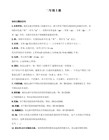
Hornby)教授执教日本期间所编写的一部针对非母语人士(主要是以日本人为代表的亚洲读者)的学习型词典《现代英语学习词典》(A Learner's
Dictionary of Current English)……在英美两系之外,另有一本日系词典值得特别提一下,即外研社《英汉多功能词典》(A
们混同词典上架,因为本质上它们只是教辅而不是词典,它们之不能上架同于俞老师的“红宝书”不可能上架,对于一家学术书店而言,这是一个原则问题,也是我
一直以来强调的“品格重于类别”,你可以把一个书的分类搞错,这其实并不打紧,但让人无法容忍的是把两本品格悬殊的书并列在一点,相信这一点多半的爱书人
都会有同感。我特别喜欢北京贝贝特印在书前扉页上的一句话:“为了人与书的相遇”――那么对于一家书店最平实的表述就是“人与书相遇的地方”,我们只向读
一本词典都是“好”词典,大家如果对此缺乏感知的话,可以到各大超市的天地图书去看一下,就会明白什么是成语“良莠不齐”“泥沙俱下”的真实写照。其次是
因为词典本身的重要性,两千多年前孔子就曾教导我们“工欲善其事,必先利其器”,对于各段英语学习者而言这个“器”指的就是一本或者几本得心应手的英语词
典。相信在座的各位或许还记得我在上上上次例会专题讲过郝明义先生的《越读者》一书,他用“主食”“美食”“蔬果”“甜食”为阅读分类,那么包括英语词典
《牛津袖珍英汉双解词典》(Pocket Oxford English-Chinese Dictionary,简称POECD)
《牛津英汉双解小词典》(Little Oxford English-Chinese Dictionary,简称LOECD)
【免费下载】世界著名英语词典
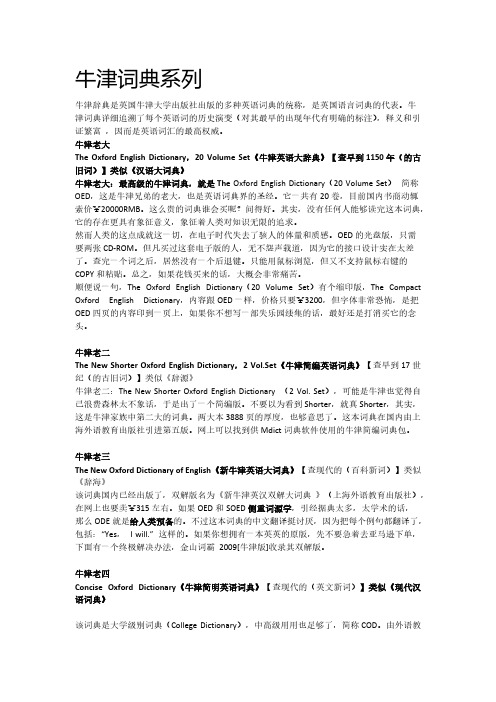
牛津词典系列牛津辞典是英国牛津大学出版社出版的多种英语词典的统称,是英国语言词典的代表。
牛津词典详细追溯了每个英语词的历史演变(对其最早的出现年代有明确的标注),释义和引证繁富,因而是英语词汇的最高权威。
牛津老大The Oxford English Dictionary,20 Volume Set《牛津英语大辞典》【查早到1150年(的古旧词)】类似《汉语大词典》牛津老大:最高级的牛津词典,就是The Oxford English Dictionary(20 Volume Set)简称OED,这是牛津兄弟的老大,也是英语词典界的圣经。
它一共有20卷,目前国内书商动辄索价¥20000RMB。
这么贵的词典谁会买呢?问得好。
其实,没有任何人能够读完这本词典,它的存在更具有象征意义,象征着人类对知识无限的追求。
然而人类的这点成就这一切,在电子时代失去了骇人的体量和质感。
OED的光盘版,只需要两张CD-ROM。
但凡买过这套电子版的人,无不怨声载道,因为它的接口设计实在太差了。
查完一个词之后,居然没有一个后退键。
只能用鼠标浏览,但又不支持鼠标右键的COPY和粘贴。
总之,如果花钱买来的话,大概会非常痛苦。
顺便说一句,The Oxford English Dictionary(20 Volume Set)有个缩印版,The Compact Oxford English Dictionary,内容跟OED一样,价格只要¥3200,但字体非常恐怖,是把OED四页的内容印到一页上,如果你不想写一部失乐园续集的话,最好还是打消买它的念头。
牛津老二The New Shorter Oxford English Dictionary,2 Vol.Set《牛津简编英语词典》【查早到17世纪(的古旧词)】类似《辞源》牛津老二:The New Shorter Oxford English Dictionary (2 Vol. Set),可能是牛津也觉得自己浪费森林太不象话,于是出了一个简编版。
牛津高阶英汉双解词典(第四版)K

K, k/ keI; ke/ n (pl K's, k's / keIz; kez/) the eleventh letter of the English alphabet 英语字母表的第十一个字母: `King' begins with (a) K/`K' king字以k字母开始.K/ keI; ke/ abbr 缩写= 1 kelvin(s). 2 (infml 口) one thousand (Greek kilo-) 一千(源自希腊文kilo-): She earns 12K (ie 12000) a year. 她一年挣12000英镑.phonetic (K.K. Vowels)/ fE5netIk; fE`nZtIk/ The K.K. phonetic symbols (音标)used in this dictionary contains the following vowels and diphthongs. Press the pronunciation button to hear the sounds they represent.1. i -- Example: see / si:; si/2. I -- Example: sit / sIt; sIt/3. e -- Example: ten / ten; tZn/4. A -- Example: hat / hAt; hAt/5. B -- Example: arm / B:m; Brm/6. C -- Example: watch / wCtF; wBtF/7. R -- Example: saw / sR:; sR/8. J -- Example: put / pUt; pJt/9. u -- Example: too / tu:; tu/ 10. Q -- Example: cup / kQp; kQp/ 11. [ -- Example: fur / f\:(r); f[/ 12. E -- Example: ago / E5gEU; E`^o/ 13. e -- Example: page / peIdV; pedV/ 14. o -- Example: home / hEUm; hom/ 15. aI -- Example: five / faIv; faIv/ 16. aJ -- Example: now / naU; naJ/ 17. RI -- Example: join / dVRIn; dVRIn/ 18. IE -- Example: near / nIE(r); nIE(r)/ 19. ZE -- Example: hair / heE(r); hZE(r)/ 20. JE -- Example: tour / tUE(r); tJE(r)/phonetic (K.K. Consonants)/ fE5netIk; fE`nZtIk/ The K.K. phonetic symbols (音标)used in this dictionary contains the following consonants. Press the pronunciation button to hear the sounds they represent. 1. p -- Example: pen / pen; pZn/ 2. b -- Example: bad / bAd; bAd/ 3. t -- Example: tea / ti:; ti/ 4.d -- Example: did / dId; dId/ 5. k -- Example: cat / kAt; kAt/ 6. ^ -- Example: got / gCt; ^Bt/ 7. tF -- Example: chin / tFIn; tFIn/ 8. dV -- Example: June / dVu:n; dVun/ 9.f -- Example: fall / fR:l; fRl/ 10. v -- Example: voice / vRIs; vRIs/ 11. W -- Example: thin / WIn; WIn/ 12. T -- Example: then / Ten; TZn/ 13. s -- Example: so / sEU; so/ 14. z -- Example: zoo / zu:; zu/ 15. F -- Example: she / Fi:; Fi/ 16. V -- Example: vision / 5vIVn; `vIVEn/ 17. h -- Example: how / haU; haJ/ 18. m -- Example: man / mAn; mAn/ 19. n -- Example: no / nEU; no/ 20. N -- Example: sing / sIN; sIN/ 21. l -- Example: leg / leg; lZ^/ 22. r -- Example: red / red; rZd/ 23. j -- Example: yes / jes; jZs/ 24. w -- Example: wet / wet; wZt/kaffir/ 5kAfE(r); `kAfL/ n (S African <!> offensive 南非, 讳, 蔑) black African person 非洲黑人. kaftan= caftan.Kaiser/ 5kaIzE(r); `kaIzL/ n title of the German and Austro-Hungarian emperors until 1918 皇帝(尤指1918年前的德国皇帝).kale (also kail)/ keIl; kel/ n [U] type of cabbage with curly leaves 羽衣甘蓝.kaleidoscope/ kE5laIdEskEUp; kE`laIdE9skop/ n (a) toy consisting of a tube containing small loose pieces of coloured glass, etc and mirrors which reflect these to form changing patterns when the tube is turned 万花筒. (b) (usu sing 通常作单数) (fig 比喻) constantly and quickly changing pattern 千变万化; 瞬息万变: His paintings are a kaleidoscope of gorgeous colours. 他的油画色彩斑斓,变化万千. * The bazaar was a kaleidoscope of strange sights and impressions. 集市的景象光怪陆离, 纷然杂陈.kaleidoscopic/ kE9laIdE5skCpIk; kE9laIdE`skBpIk/ adj.kaleidoscopically/ -klI; -klI/ adv.kamikaze/ 9kAmI5kB:zI; 9kBmI`kBzi/ n (in World War II) (pilot of a) Japanese aircraft deliberately crashed on enemy ships, etc (第二次世界大战中日本的)神风飞机, 神风飞机飞行员(与敌舰等同归於尽的自杀飞机或驾驶员): [attrib 作定语] a kamikaze attack 神风飞机的攻击* (fig 比喻) kamikaze (ie suicidal) tactics 同归於尽的战术.kangaroo/ 9kANgE5ru:; 9kAN^E`ru/ n (pl ~s) Australian animal that jumps along on its strong hind legs, the female carrying its young in a pouch on the front of its body 袋鼠(产於澳洲). =>illus 见插图.kangaroo courtillegal court formed by a group of prisoners, striking workers, etc to settle disputes among themselves 私设的公堂(囚犯、罢工工人等为解决内部纠纷而设的).kaolin/ 5keIElIn; `keElIn/ n [U] (also china `clay) fine white clay used in making porcelain and in medicine 高岭土; 瓷土.kapok/ 5keIpCk; `kepBk/ n [U] substance like cotton wool, used for stuffing cushions, soft toys, etc 木棉.kaput/ kE5pUt; kE`pJt/ adj [pred 作表语] (sl 俚) broken; ruined; not working properly 完蛋了; 失败了; 坏了: The car's kaput we'll have to walk. 汽车坏了--我们只好步行.karat(US) = carat 2.karate/ kE5rB:tI; kE`rBtI/ n [U] Japanese system of unarmed combat in which the hands, feet, etc are used as weapons 空手道(日本式徒手武术): [attrib 作定语] akarate chop, ie a blow with the side of the hand 空手道的掌侧劈.karma/ 5kB:mE; `kBrmE/ n [U] (a) (in Buddhism and Hinduism) sum of a person's actions in one of his successive lives, believed to decide his fate in the next (佛教和印度教的)业(音译`羯磨', 意为个人行为的总和可决定其来世的命运). (b) (esp joc 尤作戏谑语) destiny; fate 命运; 宿缘: It's my karma always to fall in love with brunettes. 我爱上的总是深褐色头发、浅黑色皮肤的白种女子, 这是我的缘分.kart/ kB:t; kBrt/ n = go-kart.kayak/ 5kaIAk; `kaIAk/ n. =>illus at canoe 见canoe插图. (a) Eskimo canoe made of light woodcovered with sealskins 海豹皮船(爱斯基摩人制的单人小舟). (b) small covered canoe resembling this (类似海豹皮船的)小艇.kazoo/ kE5zu:; kE`zu/ n (pl ~s) toy musical instrument that gives a buzzing sound when sb blows through it while humming 一种玩具笛.KB/ 9keI 5bi:; 9ke `bi/ abbr 缩写= (Brit law 律) King's Bench. Cf 参看QB.KBE/ 9keI bi: 5i:; 9ke bi `i/ abbr 缩写= (Brit) Knight Commander (of the Order) of the British Empire (第二等的)大英帝国最高勋爵; 英帝国爵级司令勋章: be made a KBE 受封(第二等的)大英帝国最高勋爵位* Sir John Brown KBE 约翰·布朗(第二等的)大英帝国最高勋爵士. Cf 参看CBE, DBE, MBE.KC/ 9keI 5si:; 9ke `si/ abbr 缩写= (Brit law 律) King's Counsel. Cf 参看QC.kebab/ kI5bAb; kE`bAb/ n (often pl 常作复数) small pieces of meat and vegetables cooked and (often) served on a skewer 烤肉串: lamb kebabs 烤羊肉串* shish kebab 烤肉串.shish kebab/ 9FIF kI5bAb; ?@ 5FIF kEbAb; `FIF kE9bBb/ = kebab.kedgeree/ 5kedVEri:, 9kedVE5ri:; `kZdVE9ri, 9kZdVE`ri/ n [U, C] cooked dish of rice and fish, with hard-boiled eggs and sometimes onions, all mixed together 鱼蛋烩饭(有时伴有洋葱).keel/ ki:l; kil/ n 1 timber or steel structure along the bottom of a ship, on which the framework is built up (船的)龙骨: lay down a keel, ie start building a ship 安龙骨(动工造船). 2 (idm 习语) on an even keel => even1.keelv (phr v) keel over 1 (of a ship) capsize (指船)倾覆, 翻倒. 2 (infml 口) fall over; collapse 倒下; 倒塌: After a couple of drinks he just keeled over on the floor. 他喝了两杯酒後就跌倒在地了. * The structure had keeled over in the high winds. 那座建筑物让大风给刮倒了.keen/ ki:n; kin/ adj (-er, -est) 1 ~ (to do sth/that...) eager; enthusiastic 热切的; 热情的; 热心的: a keen swimmer 喜好游泳的人* I'm not keen to go again. 我不太想再去了. * She's keen that we should go. 她热情地叫我们去. 2 (of feelings, etc) intense; strong; deep (指感情等)热烈的, 强烈的, 深刻的: a keen desire, interest, sense of loss 强烈的愿望、兴趣、失落感. 3 (of the senses) highly developed (指感觉)灵敏的, 敏锐的: Dogs have a keen sense of smell. 狗的嗅觉很灵敏. 4 (of the mind) quick to understand (指头脑)敏捷的, 精明的: a keen wit, intelligence 敏捷的头脑、很强的理解力. 5 [esp attrib 尤作定语] (of the points and cutting edges of knives, etc) sharp (指刀等的尖和刃)锋利的, 快的: a keen blade, edge 锋利的刀片、刀刃. 6 (of a wind) bitterly cold (指风)刺骨的, 凛冽的. 7 (Brit) (of prices) low; very competitive (指价格)低廉的, 竞争力强的. 8 (idm 习语) (as) ,keen as `mustard (infml 口) extremely eager or enthusiastic 极热心的; 极热情的. keen on sth/sb (infml 口) (a) interested in sth 热衷於某事物: keen on (playing) tennis 很喜欢(打)网球. (b) fond of sb/sth 喜爱某人[某事物]: He seemed mad keen on (ie very interested in) my sister. 他发疯似的爱著我妹妹. * I'mnot too keen on jazz. 我不太喜欢爵士乐. (c) enthusiastic about sth 对某事物满腔热情的: She's not very keen on the idea. 她对那主张不很感兴趣. * Mrs Hill is keen on Tom's marrying Susan. 希尔太太很希望汤姆能和苏珊结婚.keenlyadv.keennessn [U].keen/ ki:n; kin/ v [I] (usu in the continuous tenses 通常用於进行时态) lament a dead person by wailing 为死者恸哭、哀号: keening over her murdered son 恸哭她那被谋害的儿子.keenn Irish funeral song accompanied by wailing 爱尔兰哀歌(边哭边唱).keep/ ki:p; kip/ v (pt, pp kept / kept; kZpt/) 1 (a) [La, Ipr, Ip] continue to be in the specified condition or position; remain or stay 继续处於某状态或地位; 留下; 保留: She has the ability to keep calm in an emergency. 她有处变不惊的本事. * Please keep quiet -- I'm trying to get some work done. 请安静--我要处理一些工作. * You ought to keep indoors with that heavy cold. 你患重感冒应该留在屋里. * The notice said `Keep off (ie Do not walk on) the grass'. 布告牌上写著`勿踏草地'. * Keep back! The building could collapse at any moment. 别靠近! 那建筑物随时可能倒塌. (b) [Ip] ~ (on) doing sth continue doing sth; do sth repeatedly or frequently 继续做某事物; 重复做某事物: keep eating, laughing, smiling, walking 一直在吃、笑、微笑、走* Keep (on) talking amongst yourselves, I'll be back in a minute. 你们继续谈, 我一会儿就回来. * How can I trust you if you keep lying to me? 你要是一直欺骗我, 我怎麽能相信你呢? * I do wish you wouldn't keep interrupting me! 希望你别老来打扰我! * My shoe laces keep (on) coming undone. 我的鞋带总是松开. * Keep going (ie Do not stop) until you reach a large roundabout. 继续走就走到一个宽阔的环状交叉路口了. * This is exhausting work, but I manage to keep going somehow. 这个工作很费力气, 但是我尽量设法做下去. (c) [Ipr, Ip] continue to move in the specified direction 继续朝某方向前进: Traffic in Britain keeps to the left, ie drives on the left-hand side of the road. 在英国, 车辆靠左行驶. * Keep straight on until you get to the church. 一直朝前走就走到教堂了. * The sign says `Keep Left', so I don't think we can turn right here. 路标上写著`靠左行', 我想不能从这儿向右拐. 2 [Tn.pr, Tn.p, Cn.a, Cn.g] cause sb/sth to remain in the specified condition or position 使某人[某事物]保持某状态或某地位: If your hands are cold, keep them in your pockets. 要是手冷, 就揣在口袋里. * Extra work kept him (late) at the office. 他因有额外的工作, (很晚)仍留在办公室里. * Don't keep us in suspense any longer -- what happens at the end of the story? 别再让我们蒙在鼓里了, 结局究竟怎麽样? * keep sb amused, cheerful, happy, etc 使某人一直高兴、快乐、幸福等* These gloves will keep your hands warm. 这种手套保暖好. * Give the baby her bottle; that'll keep her quiet for a while. 把瓶子给孩子, 那就能让她安静一会儿. * He's in a coma and is being kept alive by a life-support machine. 他处於昏迷状态, 靠生命维持器活著. * I'm sorry to keep you waiting. 对不起, 让您久等了. * Add some more coal to keep the fire going. 再添些煤, 别让火灭了. 3 [Tn] detain or delay (sb) 留住或耽搁(某人): You're an hour late; what kept you? 你晚了一小时, 是什麽事给耽误了? Cf 参看keep sb from sth/doing sth. 4 [Tn] (a) continue to have (sth); retain 保有, 留下(某物): You can keep that book I lent you; I don't want it back. 我借给你的那本书你可以留下, 不用还我. * Here's a five-pound note -- you can keep the change. 这是五镑的钞票--零钱不用找了. (b) [Tn, Tn.pr, Dn.n] ~ sth (for sb) look after sth (for sb); retain sth (为某人)照顾某事物; 保留某事物: Could you keep my place in the queue (for me)(ie prevent anybody else from taking it)? 我排在队里的位置可以给我留著吗? * Please keep me a place in the queue. 排队时请给我占个位置. (c) [Tn, Tn.pr] have (sth) in a particular place; store 在某处存放(某物); 贮藏: Where do you keep the cutlery? 你的餐具在哪里? * We haven't enough shelves to keep all our books on. 我们的书架不够用, 放不下这麽多书. * Always keep your driving licence in a safe place. 驾驶执照一定要妥善保管. (d) [Tn] retain (sth) for future use or reference 保留(某物)(以备日後之需): These trousers are so worn they're hardly worth keeping. 这条裤子磨损得很厉害, 不必再留著了. * Let's not eat all the sandwiches now -- we can keep some for later. 咱们别把三明治都吃光--可以留些过後再吃. * I keep all her letters. 我保留著她全部的信. 5 [Tn] own and manage (a shop, restaurant, etc) 经营, 开设(商店、饭馆等): Her father kept a grocer's shop for a number of years. 她父亲开了几年杂货店. * He plans to keep a pub when he retires. 他打算退休後开酒馆. 6 [Tn] own and look after (animals) for one's use or enjoyment (为自用或消遣)饲养(动物): keep bees, goats, hens, etc 饲养蜂、羊、鸡等. 7 [Tn] have (sth) regularly on sale or in stock 经销、销售或储存(某物): `Do you sell Turkish cigarettes?' `I'm sorry, we don't keep them.' `你们卖土耳其香烟吗?'`对不起, 我们不卖那种香烟.'8 [Tn] not reveal (a secret) 保守(秘密): Can you keep a secret? ie If I tell you one, can I be sure that you will not tell it to sb else? 我想告诉你一件事, 你能保密吗? 9 [I] (of food) remain in good condition (指食物)保持不坏: Do finish off the fish pie; it won't keep. 鱼馅糕饼留不住, 都吃了吧. * (fig 比喻) The news will keep, ie can be told later rather than immediately. 这消息可容後宣布. 10[I] (used with an adv, or in questions after how 与副词连用或用於疑问句中的how之後) be in the specified state of health 处於某种健康状况: `How are you keeping?' `I'm keeping well, thanks.' `你身体好吗?'`很好, 谢谢.'11 [Tn] (a) make written entries in (sth) 在(某物)上作书面记载: She kept a diary for over twenty years. 她写日记已二十多年. (b) write down (sth) as a record 记录(某事): keeping an account/a record of what one spends each week 记录每周的开支. 12 [Tn] provide what is necessary for (sb); support (sb) financially 供给(某人)必需品; 经济上支持(某人): He scarcely earns enough to keep himself and his family. 他挣的钱难以维持全家人的生活. 13 (a) [Tn] guard or protect (sth) 守卫或把守(某物): keep goal, ie in football 守球门(足球的) ?w * keep wicket, ie in cricket 守三柱门(板球的). Cf 参看goalkeeper (goal), wicket-keeper (wicket). (b) [Tn, Tn.pr] ~ sb (from sth) (fml 文) protect sb (from sth) 保护或保佑某人: May the Lord bless you and keep you, ie used in prayers in the Christian Church 愿上帝祝福你、保佑你(用於基督教会的祈祷)* She prayed to God to keep her son from harm. 她祈祷上帝保佑儿子平安. 14 [Tn] be faithful to (sth); respect or observe 忠於(某事物); 尊重; 遵守: keep an appointment, the law, a promise, a treaty 遵守约会、法律、诺言、条约. 15 (idm 习语) ,keep it `up maintain a high standard of achievement 保持优秀成绩: Excellent work, Cripps keep it up! 克里普斯, 你干得真好--要保持下去! ,keep up with the `Joneses/ 5dVEUnzIz; `dVonzIz/ (infml often derog 口, 常作贬义) try to maintain the same social and material standards as one's neighbours 要在地位和物质方面比得上周围的人. (For other idioms containing keep, see entries for ns, adjs, etc 与keep搭配的其他习语见有关名词、形容词等的词条, 如keep house => house1; keep the ball rolling => ball1.) 16 (phr v) keep (sb) at sth (cause sb to) continue to work at sth (使某人)继续做某事: Come on, keep `at it, you've nearly finished! 加油, 别松劲, 你眼看就完成了! * The teacher kept us at our `work all morning. 老师让我们做了一上午的功课.keep (sb/sth) away (from sb/sth)(cause sb/sth) not to go near sb/sth (使某人[某事物])不靠近某人[某事物]: Police warned bystanders to keep away from the blazing building. 警察告诫围观者, 不要靠近燃烧的建筑物. * Her illness kept her away from (ie caused her to be absent from) work for several weeks. 她因病数周未上班.keep sth back(a) prevent sth from moving; restrain sth 使某事物不能移动; 阻止某事物: Millions of gallons of water are kept back by the dam. 这个堤坝拦住了滔滔的洪水. * She was unable to keep back her tears. 她无法忍住泪水. (b) not pay sth to sb 不将某物付给某人: A certain percentage of your salary is kept back by your employer as an insurance payment. 雇主扣下你部分薪金作保险金用. keep sth `back (from sb) refuse to tell sb sth; hold sth back 拒不将某事告诉某人; 隐瞒某事物: I'm sure she's keeping something back (from us). 我肯定她(向我们)隐瞒什麽. keep (sb) `back (from sb/sth) (cause sb to) remain at a distance from sb/sth (使某人)与某人[某事物]保持距离: Keep well back from the road. 离马路远些. * Barricades were erected to keep back the crowds. 设置了障碍以隔开人群.keep downnot show where one is; not stand up 隐蔽; 不站立: Keep down! You mustn't let anybody see you. 蹲下! 一定不要让人看见你. keep sb `down repress or oppress (a people, nation, etc) 压制或镇压(人民、国民等): The people have been kept down for years by a brutal regime. 人民多年遭受野蛮制度压迫. keep sth `down (a) not raise (a part of the body) 不抬起(身体某部分): Keep your head down! 不要抬头! (b) retain sth in the stomach 吞下某物; 不吐出来: The medicine was so horrid I couldn't keep it down, ie I was sick. 这药这麽难吃, 我咽不下去. (c) cause sth to remain at a low level; not increase sth 使某事物处於低水平; 压抑某事物: keep down wages, prices, the cost of living, etc 保持低工资、低价格、低生活费等* Keep your voices down; your mother's trying to get some sleep. 小点声, 你妈妈要睡觉了. (d) not allow sth to multiply or grow 不使某物滋生或生长: use chemicals to keep pests down 用化学药品消灭害虫.keep oneself/sb from sth/doing sthprevent oneself/sb from doing sth 使自己[某人]不能做某事物: The church bells keep me from sleeping. 教堂的钟声吵得我睡不觉. * I hope I'm not keeping you from your work. 希望我没有妨碍你的工作. keep (oneself) from doing sth prevent oneself from doing sth; stop (oneself) doing sth 克制自己不做某事: She could hardly keep (herself) from laughing. 她忍不住大笑起来. * I just managed to keep myself from falling. 我差一点跌倒. keep sth from sb not tell sb sth 不将某事告诉某人: I think we ought to keep the truth from him until he's better. 我想等他好些再把实情告诉他. * They don't keep anything from each other. 他们之间无话不谈.keep sb indetain (a child) after normal school hours as a punishment 罚(小学生)课後留校: She was kept in for an hour for talking in class. 她因上课说话被罚留校一小时. keep sth in not express (an emotion); restrain sth 不表露(情感); 控制某事物: He could scarcely keep in his indignation. 他愤怒得难以自持. keep oneself/sb in sth give or allow oneself/sb a regular supply of sth 使自己[某人]经常有某事物: She earns enough to keep herself and all the family in good clothes. 她的收入能让全家经常有好衣服穿. keep in with sb (infml 口) continue to be friendly with sb, esp in order to gain some advantage 保持与某人亲近(尤指为得到好处): Have you noticed how he tries to keep in with the boss? 你注意到他多巴结老板了吗?keep off(of rain, snow, etc) not begin (指雨、雪等)未下: The fete will go ahead provided the rain keeps off. 要是不下雨, 义卖会就照常进行. keep off (sb/sth) not approach, touch, etc sb/sth 不接近或不接触某人[某事物]. keep off sth (a) not eat, drink or smoke sth 不吃、不喝或不吸食某物: keep off cigarettes, drugs, drink, fatty foods 不抽烟、不吸毒、不喝酒、不吃多油脂的食物.(b) not mention (the specified subject); avoid 不提(某话题); 避免: Please keep off (the subject of) politics while my father's here. 有我父亲在场, 请别谈政治. keep sb/sth off (sb/sth) cause sb/sth not to approach, touch, etc sb/sth 使某人[某事物]不接近或不接触某人[某事物]: They lit a fire to keep wild animals off. 他们燃起篝火防止野兽接近. * Keep your hands off (ie Do not touch) me! 别碰我!keep oncontinue one's journey 继续行进: Keep on past the church; the stadium is about half a mile further on. 一直向前走过了教堂, 约莫半英里就是体育场. keep on (doing sth) continue (doing sth) 继续(做某事物): The rain kept on all night. 雨彻夜不停. * She kept on working although she was tired. 她虽疲劳但仍继续工作. keep sb `on continue to employ sb 继续雇用某人: He's incompetent and not worth keeping on. 他庸碌无能, 不值得留用. keep sth on (a) continue to wear sth 继续穿戴某物: You don't need to keep your hat on indoors. 在室内不必戴帽子了.(b) continue to rent or be the owner of (a house, flat, etc) 继续租用或领有(房屋、寓所等): We're planning to keep the cottage on over the summer. 我们打算夏天继续租那座别墅. keep `on (at sb) (about sb/sth) continue talking (to sb) in an irritating way (about sb/sth) (向某人)唠叨: He does keep on so! 他就是这样爱唠叨! * I will mend the lamp just don't keep on at me about it! 我一定修这个灯--别再跟我唠叨这件事了!keep out(of sth) not enter (a place); remain outside 不进入(某处); 留在外边: The sign said `Ministry of Defence Danger Keep Out!' 牌子上写, 国防部重地--闲人免进!keep sb/sth out (of sth) prevent sb/sth from entering (a place) 不让某人[某物]进入(某处): Keep that dog out of my study! 别让那条狗进我的书房! * She wore a hat to keep the sun out of her eyes. 她戴帽子遮阳, 保护眼睛. keep (sb) out of sth not expose oneself/sb to sth; (cause sb to) avoid sth 遮掩自己[某人]; (使某人)避开某事物: Do keep out of the rain if you haven't a coat. 没带雨衣那就避一下雨. * That child seems incapable of keeping out of (ie not getting into) mischief. 那个孩子不调皮捣蛋简直就受不了. * Keep the children out of harm's way if you take them to the match. 带孩子看比赛, 要注意他们的安全.keep to sth(a) not wander from or leave (a path, road, etc) 不偏离, 不离开(道路等): Keep to the track the moor is very boggy around here. 不要偏离车道--这一带沼泽地多. * (fig 比喻) keep to the point/subject 别扯远了[不要离题]. (b) follow or observe (a plan, schedule, etc) 遵循, 遵守(计划、时刻表等): Things will only work out if we all keep to the plan. 只有大家执行计划, 事情才能成功. (c) remain faithful to (a promise, etc)忠於, 信守(诺言等): keep to an agreement, an undertaking 信守协定、承诺. (d) remain in and not leave (the specified place or position) 留在, 不离开(某地或某位置): She's old and infirm and has to keep to the house. 她因年老体弱而足不出户. (e) (used esp in the imperative when rebuking sb 尤用於祈使语气以指责某人) not express (a comment, view, etc) 不必说出(意见、看法等): Keep your opinions to yourself in future! 你有意见留自己用吧! keep (oneself) to oneself avoid meeting people socially; not concern oneself with other people's affairs 不与人交往: Nobody knows much about him; he keeps himself (very much) to himself. 谁都不太了解他, 因为他很少与人来往. keep sth toone`self not tell other people about sth 不把某事告诉别人: I'd be grateful if you kept this information to yourself. 这事你若能保密则不胜感激.keep sb underoppress sb 压迫某人: The local population is kept under by a brutal army of mercenaries. 当地居民备受野蛮雇佣军的欺压. keep sth under control or suppress sth 控制或压制某事物: Firemen managed to keep the fire under. 消防队员尽力控制了火势.keep up(of rain, snow, good weather, etc) continue without stopping (指雨、雪、好天气等)持续不停: Let's hope the sunny weather keeps up for Saturday's tennis match. 但愿星期六网球比赛时还是这样的好天气. keep sb up prevent sb from going to bed 使某人不能去睡觉: I do hope we're not keeping you up. 我希望我们没有耽误你睡觉. keep sth up (a) prevent sth from falling down 使某物不落下: wear a belt to keep one's trousers up 系腰带以系住裤子. (b) cause sth to remain at a high level 使某事物处於高水平: The high cost of raw materials is keeping prices up. 原料费用昂贵使得产品价格居高不下. (c) not allow (one's spirits, strength, etc) to decline; maintain 不让(精力等)衰退; 维持; 保持: They sang songs to keep their morale up. 他们唱歌以保持高昂的士气. (d) continue sth at the same (usu high) level 继续使某事物保持同样的(通常指高的)水平: The enemy kept up their bombardment day and night. 敌军一直日夜不停地狂轰滥炸. * We're having difficulty keeping up our mortgage payments. 我们难以继续支付分期偿还的抵押贷款. * You're all doing a splendid job; keep up the good work! 你们干得都很出色, 要坚持下去! (e) continue to practise or observe sth 照旧做某事物或遵守某事: keep up old customs, traditions, etc 沿袭古老的风俗、传统等* Do you still keep up your Spanish? 你仍在学西班牙语吗? (f) maintain (a house, garden, etc) in good condition by spending money or energy on it 保养, 维修(房屋、花园等): The house is becoming too expensive for them to keep up. 他们的房子维修费用贵得越来越修不起了. Cf 参看upkeep. keep `up (with sb/sth) move or progress at the same rate (as sb/sth) 跟上(某人[某事物]); (与某人[某事物])同步前进: Slow down I can't keep up (with you)! 慢点, 我跟不上(你)了! * I can't keep up with all the changes in computer technology. 计算机技术的各种改进有些我已跟不上了. keep up (with sth) rise at the same rate (as sth) 以(某事物的)同样速率上升: Workers' incomes are not keeping up with inflation. 工人的收入赶不上通货膨胀. keep up with sb continue to be in contact with sb 保持与某人的联系: How many of your old school friends do you keep up with? 你和中学时的老同学保持联系的有多少? keep up with sth inform oneself or learn about (the news, current events, etc) 知悉(消息); 跟上(形势): She likes to keep up with the latest fashions. 她喜欢穿戴入时.kept woman(dated or joc 旧或谑) woman who is provided with money and a home by a man with whom she is having a sexual relationship (受供养的)姘妇.keep/ ki:p; kip/ n 1 [U] (cost of providing) food and other necessities of life 食物等生活必需品; 生活费: It's time you got a job and started paying for your keep! 你该找份工作, 负担自己的生活费了! * (fig 比喻) Does that old car still earn its keep? ie Is it useful enough to be worth the cost of keeping it? 那辆旧汽车还值得维修吗? 2 [C] strongly built tower of an ancient castle 古代城堡中的强固主楼. 3 (idm 习语) for `keeps (infml 口) permanently; for ever 永远地; 永久地: Can I have it for keeps or do you want it back? 我可以永久保留它呢还是要我还给你? keeper/ 5ki:pE(r); `kipL/ n 1 person who looks after animals in a zoo or a collection of items in a museum (动物园的)饲养员; (博物馆的)保管人. 2 (esp in compounds 尤用以构成复合词) person who is in charge of or looks after sth 负责或照料某事物的人: a `lighthouse-keeper * a `gamekeeper * a `shopkeeper. 3 (infml 口)(a) = goalkeeper (goal). (b) = wicket-keeper (wicket). 4 (idm 习语) finders keepers => finder (find1).keeping/ 5ki:pIN; `kipIN/ n (idm 习语) for safe keeping => safe1. in sb's keeping in sb's care or custody 在某人处保管; 受某人监护: I'll leave the keys in your keeping. 我把钥匙交你保管. in/out of keeping (with sth) in/not in conformity or harmony 一致[不一致]; 协调[不协调]: a development wholly in keeping with what we expected 与我们预期完全相符的发展* That tie is not quite in keeping. 那条领带不十分协调. in safe keeping => safe1.keepsake/ 5ki:pseIk; `kip9sek/ n gift, usu small and often not very costly, that is kept in memory of the giver or previous owner 纪念品: My aunt gave me one of her brooches as a keepsake. 我的姑母把她的一只胸针送给我作纪念.keg/ keg; kZ^/ n small barrel, usu containing less than 10 British or 30 US gallons of liquid 小桶(通常容量不足10英加仑或30美加仑). =>illus at barrel 见barrel插图.keg beer(Brit) beer served from kegs, using gas pressure 小桶啤酒(用气压压出).kelp/ kelp; kZlp/ n [U] type of large brown seaweed 大型褐藻.kelvin/ 5kelvIn; `kZlvIn/ n (abbr 缩写K) unit (equal tothe Celsius degree) of an international scale of temperature(the Kelvin scale) with 0 at absolute zero (273.15C) 开(开尔文温标的计量单位, 其零度为绝对零度, 等於273.15C). =>App 11 见附录11.ken/ ken; kZn/ n (idm 习语) beyond/outside one's ken not within one's range of knowledge 超出某人知识范围: The workings of the Stock Exchange are beyond most people's ken. 证券交易所的运作情况大多数人都不了解.ken/ ken; kZn/ v (-nn-, pt kenned or kent, pp kenned) [Tn, Tf, Tw] (Scot 苏格兰) know 知道. kennel/ 5kenl; `kZnl/ n 1 [C] shelter for a pet dog 狗窝; 狗房: Rover lives in a kennel in the back garden. 小狗罗弗的窝在後花园. 2 [C] shelter for a pack of hounds 一群猎犬的窝棚. 3 kennels [sing or pl v] place where dogs are bred, cared for, etc 养狗场: We put the dog into kennels when we go on holiday. 我们去度假时把狗送到养狗场寄养.kennelv (-ll-; US also -l-) [Tn] put or keep (a dog) in a kennel or kennels 将(狗)关进狗窝或送到养狗场: She kennels her dog in the yard. 她把狗关进院子的狗窝里.kepi/ 5keIpI; `kepI/ n type of French military cap with a horizontal peak 法国军帽.keptpt, pp of keep1.kerb (also esp US curb)/ k\:b; k[b/ n stone or concrete edge of a pavement at the side of a road (镶石的)路缘, 路边: Stop at the kerb and look both ways before crossing (the road). 先站在路边看清左右再过马路. kerb-crawlingn [U] driving slowly along trying to persuade sb on the pavement to enter one's car, esp for sexual purposes 开车沿路边缓慢行驶(尤指为性关系勾引人): be arrested for kerb-crawling 因沿路边慢驶勾引人而被拘捕.kerb drillset of rules for crossing the road safely 过马路的安全规则.kerbstonen block of stone or concrete forming part of a kerb 路缘石; 路边石.kerchief/ 5k\:tFIf; `k[tFIf/ n (arch 古) 1 square piece of cloth worn on the head or round the neck, esp by women 方头巾, 方围巾(尤指女用的). 2 handkerchief 手绢.kerfuffle/ kE5fQfl; kL`fQfl/ n [U] (Brit infml 口) fuss; noise; excitement 混乱; 吵闹; 闹哄: What's all the kerfuffle (about)? 这乱哄哄的是怎麽回事?kernel/ 5k\:nl; `k[nl/ n 1 soft and usu edible part inside a nut or fruit stone (坚果或核果的)仁(通常可食). =>illus at nut 见nut插图. 2 part of a grain or seed within the hard outer shell (谷物去壳後的)粒, 子. 3 (fig 比喻) central or essential part (of a subject, plan, problem, etc) 核心; 要点; 中心: the kernel of her argument 她的论据的核心.kerosene, kerosine (also kerosine)/ 5kerEsi:n; `kZrE9sin/ n [U] (esp US) = paraffin 1: [attrib 作定语] a kerosene lamp 煤油灯. kestrel/ 5kestrEl; `kZstrEl/ n type of small falcon 红隼. =>illus at App 1 见附录1插图, page iv.ketch/ ketF; kZtF/ n small sailing-boat with two masts 双桅小帆船.ketchup/ 5ketFEp; `kZtFEp/ (also esp US catsup / 5ktsEp;`kAtsEp/) n [U] thick sauce made from tomatoes, vinegar, etc and used cold as a seasoning 番茄酱.kettle/ 5ketl; `kZtl/ n 1 container with a spout, lid and handle, used for boiling water (烧水用的)壶: boil (water in) the kettle and make some tea 烧壶水沏茶. 2 (idm 习语) a different kettle of fish => different. a `fine, `pretty, etc kettle of fish messy, unpleasant or confusing situation 一团糟; 不愉快的事; 尴尬的局面. the pot calling the kettle black => pot1.kettledrum/ 5ketldrQm; `kZtl9drQm/ n large brass or copper bowl-shaped drum with skin stretched over the top, that can be tuned to an exact pitch 定音鼓. =>illus at App 1 见附录1插图, page xi.key/ ki:; ki/ n 1 [C] metal instrument shaped so that it will move the bolt of a lock (and so lock or unlock sth) 钥匙: turn the key in the lock 转动锁孔中的钥匙* the car keys 汽车钥匙* the key to the front door 前门的钥匙* have a duplicate key cut, ie made 配钥匙. =>illus 见插图.2 [C] similar instrument for grasping and turning sth, eg for winding a clock 类似钥匙的器具(如。
朗文当代高级英语词典 牛津高阶英汉双解词典
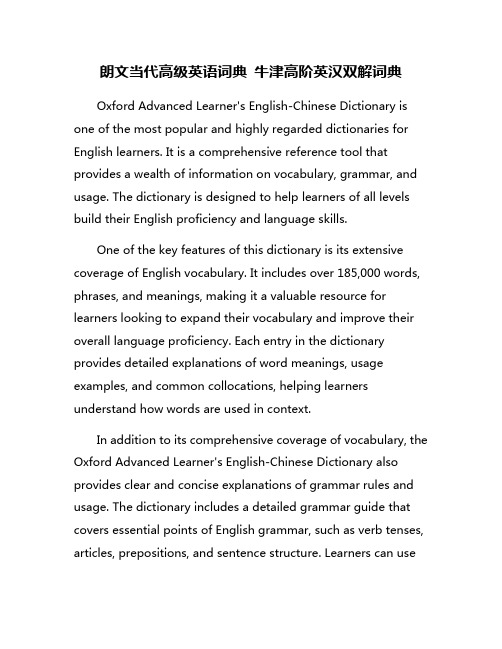
朗文当代高级英语词典牛津高阶英汉双解词典Oxford Advanced Learner's English-Chinese Dictionary is one of the most popular and highly regarded dictionaries for English learners. It is a comprehensive reference tool that provides a wealth of information on vocabulary, grammar, and usage. The dictionary is designed to help learners of all levels build their English proficiency and language skills.One of the key features of this dictionary is its extensive coverage of English vocabulary. It includes over 185,000 words, phrases, and meanings, making it a valuable resource for learners looking to expand their vocabulary and improve their overall language proficiency. Each entry in the dictionary provides detailed explanations of word meanings, usage examples, and common collocations, helping learners understand how words are used in context.In addition to its comprehensive coverage of vocabulary, the Oxford Advanced Learner's English-Chinese Dictionary also provides clear and concise explanations of grammar rules and usage. The dictionary includes a detailed grammar guide that covers essential points of English grammar, such as verb tenses, articles, prepositions, and sentence structure. Learners can usethis guide to improve their understanding of grammar rules and apply them correctly in their own writing and speaking.Another valuable feature of the Oxford Advanced Learner's English-Chinese Dictionary is its focus on language skills development. The dictionary includes a wide range of exercises and activities that help learners practice their listening, speaking, reading, and writing skills. From word puzzles and games to grammar quizzes and conversation practice, the dictionary provides a variety of engaging and interactive resources to help learners reinforce their language skills and improve their fluency.Overall, the Oxford Advanced Learner's English-Chinese Dictionary is a valuable tool for English learners of all levels. Whether you are a beginner looking to build your vocabulary, an intermediate learner wanting to refine your grammar skills, or an advanced student seeking to enhance your language proficiency, this dictionary has something to offer. With its comprehensive coverage of vocabulary, grammar, and language skills development, the dictionary is an essential resource for anyone looking to improve their English proficiency and succeed in their language learning journey.。
新牛津英汉双解大词典

牛津英汉双解大词典The New Oxford Dictionary of English(K)
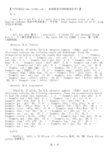
karat
(US) = carat 2.
karate
/ kE5rB:tI; kE`rBtI/ n [U] Japanese system of unarmed combat in which the hands, feet, etc are used as weapons 空手道(日本式徒手武术): [attrib 作定语] akarate chop, ie a blow with the side of the hand 空手道的掌侧劈.
kangaroo
/ 9kANgE5ru:; 9kAN^E`ru/ n (pl ~s) Australian animal that jumps along on its strong hind legs, the female carrying its young in a pouch on the front of its body 袋鼠(产於澳洲). =>illus 见插图.
K
/ keI; ke/ abbr 缩写 = 1 kelvin(s). 2 (infml 口) one thousand (Greek kilo-) 一千(源自希腊文kilo-): She earns 12K (ie 12000) a year. 她一年挣12000英镑.
phonetic (K.K. Vowels)
kaleidoscopic
/ kE9laIdE5skCpIk; kE9laIdE`skBpIk/ adj-klI; -klI/ adv.
kamikaze
/ 9kAmI5kB:zI; 9kBmI`kBzi/ n (in World War II) (pilot of a) Japanese aircraft deliberately crashed on enemy ships, etc (第二次世界大战中日本的)神风飞机, 神风飞机飞行员(与敌舰等同归於尽的自杀飞机或驾驶员): [attrib 作定语] a kamikaze attack 神风飞机的攻击 * (fig 比喻) kamikaze (ie suicidal) tactics 同归於尽的战术.
The New Oxford Dictionary of English新牛津英语词典介绍
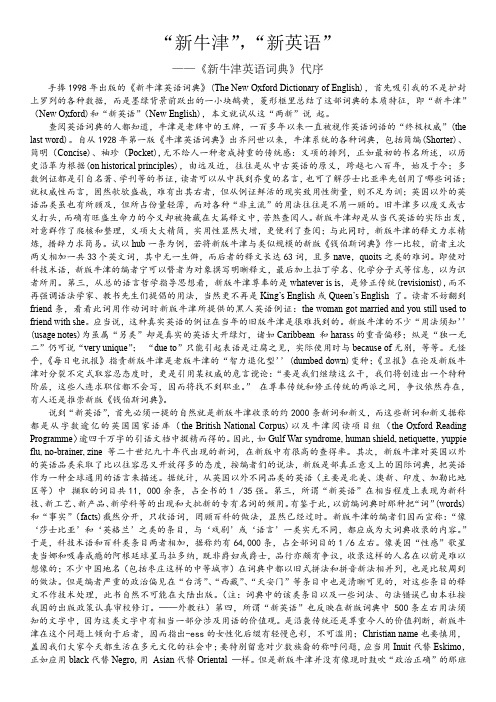
“新牛津”,“新英语”——《新牛津英语词典》代序手捧1998年出版的《新牛津英语词典》(The New Oxford Dictionary of English),首先吸引我的不是护封上罗列的各种数据,而是墨绿背景前跃出的一小块鹅黄,菱形框里总结了这部词典的本质特征,即“新牛津”(New Oxford)和“新英语”(New English),本文就试从这“两新”说起。
查阅英语词典的人都知道,牛津是老牌中的王牌,一百多年以来一直被视作英语词语的“终极权威”(the last word)。
自从1928年第一版《牛津英语词典》出齐问世以来,牛津系统的各种词典,包括简编(Shorter)、简明(Concise)、袖珍(Pocket),无不给人一种老成持重的传统感:义项的排列,正如最初的书名所述,以历史沿革为根据(on historical principles),由远及近,往往是从中古英语的原义,跨越七八百年,始及于今;多数例证都是引自名著、学刊等的书证,读者可以从中找到乔叟的名言,也可了解莎士比亚率先创用了哪些词语;就权威性而言,固然欹欤盛哉,难有出其右者,但从例证鲜活的现实致用性衡量,则不足为训;英国以外的英语品类虽也有所顾及,但所占份量轻薄,而对各种“非主流”的用法往往是不屑一顾的。
旧牛津多以废义或古义打头,而确有旺盛生命力的今义却被掩藏在大篇释文中,苦煞查阅人。
新版牛津却是从当代英语的实际出发,对意群作了爬核和整理,义项大大精简,实用性显然大增,更便利了查阅;与此同时,新版牛津的释文力求精炼,措辞力求简易。
试以hub一条为例,若将新版牛津与类似规模的新版《钱伯斯词典》作一比较,前者主次两义相加一共33个英文词,其中无一生僻,而后者的释文长达63词,且多nave,quoits之类的难词。
即使对科技术语,新版牛津的编者宁可以瞀者为对象撰写明晰释文,最后加上拉丁学名、化学分子式等信息,以为识者所用。
第三,从总的语言哲学指导思想看,新版牛津尊奉的是whatever is is,是修正传统(revisionist),而不再强调语法学家、教书先生们提倡的用法,当然更不再是King’s English或Queen’s English了。
牛津英汉高阶双解词典 繁体字
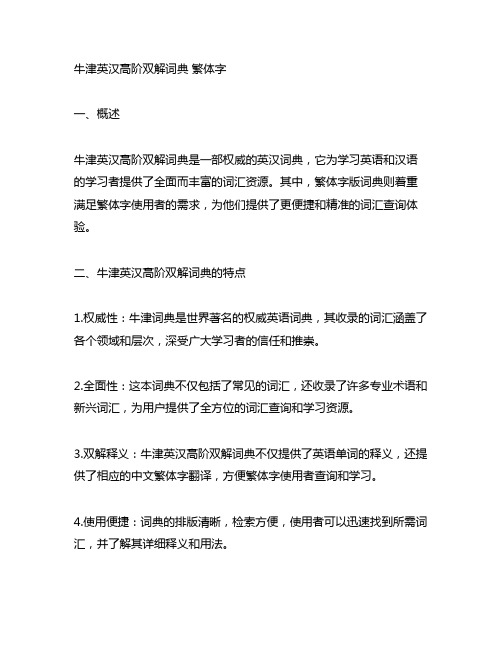
牛津英汉高阶双解词典繁体字一、概述牛津英汉高阶双解词典是一部权威的英汉词典,它为学习英语和汉语的学习者提供了全面而丰富的词汇资源。
其中,繁体字版词典则着重满足繁体字使用者的需求,为他们提供了更便捷和精准的词汇查询体验。
二、牛津英汉高阶双解词典的特点1.权威性:牛津词典是世界著名的权威英语词典,其收录的词汇涵盖了各个领域和层次,深受广大学习者的信任和推崇。
2.全面性:这本词典不仅包括了常见的词汇,还收录了许多专业术语和新兴词汇,为用户提供了全方位的词汇查询和学习资源。
3.双解释义:牛津英汉高阶双解词典不仅提供了英语单词的释义,还提供了相应的中文繁体字翻译,方便繁体字使用者查询和学习。
4.使用便捷:词典的排版清晰,检索方便,使用者可以迅速找到所需词汇,并了解其详细释义和用法。
三、繁体字在词典中的重要性1. 传承与保护:繁体字不仅是我国传统的书写形式,更是中华文化的珍贵遗产。
在当今世界格局下,保护和传承繁体字的工作显得尤为重要。
2. 满足需求:许多使用者习惯使用繁体字查阅资料和工具书,如词典、古籍等。
牛津英汉高阶双解词典繁体字版的出版,满足了这部分使用者对于词典的需求。
3. 文化连结:繁体字也是中文文化的重要符号之一,它承载着悠久的历史和丰富的文化内涵。
通过繁体字版的词典,读者也能更深入地了解和感受中文文化的魅力。
四、使用牛津英汉高阶双解词典繁体字版的意义1. 学习工具:对于学习者来说,牛津英汉高阶双解词典繁体字版是一种重要的学习工具,能够帮助他们更准确地理解和运用英语词汇。
2. 知识获取:词典不仅提供了基础词汇的释义,还包括了大量的新词和专业术语,使用者可以通过词典获取丰富的知识。
3. 参考资料:对于翻译工作者和语言爱好者来说,词典更是不可或缺的参考资料,能够帮助他们更准确地表达和理解语言。
五、结语牛津英汉高阶双解词典繁体字版的出版,为繁体字使用者提供了便捷、权威的词汇查询和学习工具,同时也对传承和保护中文繁体字具有积极的意义。
牛津高阶英汉汉英双解词典第10版 新词新意

牛津高阶英汉汉英双解词典是一部备受尊重和信赖的英语学习工具,多年来一直被视为学习者的权威指南。
该词典不仅提供了传统的释义和用法,还包括了大量的新词汇和新用法,为学习者提供了全面而深入的英语学习资源。
第10版的《牛津高阶英汉汉英双解词典》在继承前代版本精髓的基础上,进一步扩充和更新了词汇和释义,旨在为读者呈现更加丰富、全面的英语语言知识。
本文将对牛津高阶英汉汉英双解词典第10版的新词新意进行探讨,以帮助读者更好地理解这些新词汇,并掌握它们的正确用法。
一、新增词汇在当今快速变化的社会中,新词汇层出不穷,反映了人们对新事物、新概念的不断探索和发现。
《牛津高阶英汉汉英双解词典》第10版对这些新词汇进行了及时的收录和解释,使读者能够了解最新的词汇使用情况。
1.网络新词随着互联网的快速发展,网络新词层出不穷,影响着人们的日常交流和认知。
《牛津高阶英汉汉英双解词典》第10版对一些热门的网络新词进行了收录,如“binge-watch”(狂看、一口气看完)、“troll”(全球信息站骚扰者)等。
这些词汇反映了当下社会文化和科技的发展趋势,为读者提供了更加丰富的词汇资源。
2.新科技新词随着科技的不断进步,许多新科技名词也被添加到了《牛津高阶英汉汉英双解词典》第10版中。
比如“3D printing”(3D打印)、“selfie stick”(自拍杆)等,这些词汇反映了人们对科技创新的关注和应用。
通过学习这些新词汇,读者可以更好地了解和应用最新的科技成果。
3.新时尚新词时尚是社会发展的缩影,反映了人们对美的追求和审美标准的变化。
《牛津高阶英汉汉英双解词典》第10版对一些新时尚新词进行了收录,如“athleisure”(休闲健身服饰)、“normcore”(标准配饰)等。
这些词汇反映了时尚产业的多样化和个性化发展趋势,为读者提供了了解时尚潮流的新视角。
二、新词新意除了新增词汇,第10版的《牛津高阶英汉汉英双解词典》还对一些传统词汇的用法进行了更新,并添加了一些新的用法和意义,为读者呈现了词汇的多样化和丰富性。
牛津英语搭配词典英汉双解版第2版 pdf

牛津英语搭配词典英汉双解版第2版pdf全文共10篇示例,供读者参考篇1Title: My Adventures with Oxford English Collocation DictionaryHi everyone! Today I want to share with you all about my adventures with the Oxford English Collocation Dictionary. It's a super cool book that helps me learn more about how to use words together in English.First off, let me tell you what collocations are. Collocations are words that often go together, like "strong coffee" or "make a mistake." It's important to learn collocations because it can help you sound more natural and fluent in English.One of my favorite things about the Oxford English Collocation Dictionary is that it has lots of examples to show me how to use the words in different situations. For example, it taught me that we say "heavy rain" but "strong wind." Isn't that interesting?I also love how the dictionary has pictures and illustrations to help me understand the words better. Sometimes I even try to make up my own sentences with the collocations I've learned, just like a mini language detective!Another fun thing about the dictionary is that it has quizzes and activities to help me practice what I've learned. It's like a game, but I'm also learning at the same time. How cool is that?Overall, using the Oxford English Collocation Dictionary has been a great adventure for me. I feel more confident using English in my everyday conversations and writing. I can't wait to continue exploring and learning more collocations with this awesome book!So, if you're looking to level up your English skills, I highly recommend checking out the Oxford English Collocation Dictionary. It's a fun and interactive way to improve your language skills. Happy learning, everyone!篇2Hello everyone! Today I'm going to talk about the "Oxford English Collocations Dictionary for Students of English", which is a super cool book full of awesome English words and phrases.First of all, let me tell you what collocations are. Collocations are words that often go together, like "strong coffee" or "play basketball". This book helps us learn the best and most natural ways to use English words together.For example, if we want to talk about food, we can look up the word "eat" in the book and find lots of collocations like "have breakfast", "eat lunch", or "enjoy dinner". Isn't that cool?And if we want to talk about feelings, we can look up the word "happy" and find collocations like "feel happy", "make someone happy", or "look happy". It's so easy to sound like a native speaker with this book!I love using this book when I write stories or talk to my friends in English. It makes me feel more confident and helps me express myself better. I think everyone should have a copy of the "Oxford English Collocations Dictionary for Students of English" in their backpack!So, if you want to improve your English and sound more natural, definitely check out this amazing book. It's like having a superpower in your hands! Happy learning, everyone!篇3Title: My Exciting Adventure with Oxford English Collocations DictionaryHey guys, guess what? I have this super cool book called the Oxford English Collocations Dictionary! It's like a magic book that helps me learn how to use English words correctly together. Let me tell you about my adventure with this awesome dictionary.One day, I was doing my English homework and I was stuck on how to use the word "happy" correctly in a sentence. Then I remembered I had the Oxford English Collocations Dictionary. I opened it up and found out that "happy" collocates with words like "birthday", "family", and "ending". So, I wrote a sentence like "I am happy to celebrate my birthday with my family and friends" and got it right!Another time, I was writing a story about a superhero and I needed to use the word "save" in a sentence. I checked the dictionary and found out that "save" collocates with words like "life", "money", and "time". So, I wrote a sentence like "The superhero saved the little girl's life just in time" and it made my story more exciting!I also learned that using the right collocations can make my English sound more natural and native-like. It's like learning asecret language that only cool kids know. So, I always keep my Oxford English Collocations Dictionary handy whenever I write or speak in English.In conclusion, my adventure with the Oxford English Collocations Dictionary has been super fun and helpful. I feel more confident in my English skills and I can't wait to learn more collocations to impress my friends and teachers. If you want to be an English pro like me, you should definitely get this magical dictionary too! Let's learn together and become English masters!篇4Hello everyone! Today I want to share with you all about the Oxford English Collocations Dictionary for students. It's a really cool book that helps us learn how to use English words together in the right way!First of all, let me tell you what collocations are. Collocations are words that are often used together in English. For example, we say "strong coffee" not "powerful coffee" or "heavy rain" not "thick rain". These are just some examples of collocations.The Oxford English Collocations Dictionary for students is a super useful book because it helps us understand which words go together in English. It has lots of different words and shows uswhich ones are commonly used together. This makes our English sound more natural and fluent!In the book, there are lots of examples of collocations for different words. For example, if we look up the word "happy", we can see that it collocates with words like "smile", "laugh", "jolly" and "cheerful". This helps us know which words to use when we want to talk about being happy.The dictionary also has exercises and quizzes to help us practice using collocations. This is really helpful because it makes us better at using English words in the right way. Plus, it's fun to learn new words and phrases!So, if you want to improve your English and sound more like a native speaker, I recommend getting the Oxford English Collocations Dictionary for students. It's a great tool to help us learn how to use English words together in the best way possible. Happy learning!篇5Hello everyone! Today I’m going to talk about the Oxford English Collocations Dictionary for Students of English. It’s like a super cool book that helps you learn English words that gotogether. I t’s really awesome because it can make you sound more natural and fluent in English.You know how sometimes we say things like “make a decision” or “take a photo”? These are called collocations. Collocations are just words that usually go together in English. And with this book, you can learn lots of collocations to use in your speaking and writing.For example, if you want to talk about food, you can look up the word “eat” in the book and it will show you collocations like “eat breakfast”, “eat fruit”, and “eat a sandwich”. Isn’t that cool?I love using this book because it helps me sound more like a native English speaker. And it’s so fun to learn new collocations every day. I can’t wait to impress my friends and teachers with my awesome English skills!So, if you want to improve your English and sound more natural, I totally recommend getting the Oxford English Collocations Dictionary for Students of English. It’s agame-changer, trust me!That’s all for today, guys. Thanks for listenin g to my super cool article about the Oxford English Collocations Dictionary. Bye-bye!篇6Title: Let's Learn English with the Oxford English Collocations Dictionary!Hey guys! Today, I want to tell you all about this super cool book called the Oxford English Collocations Dictionary. It's like a magic book that helps you learn how to use words together in the right way. It's like having a secret code to speak English perfectly!First of all, let me explain what a collocation is. A collocation is when two or more words are often used together. For example, we say "fast food" not "quick food" because that's just the way people say it. And that's where the Oxford English Collocations Dictionary comes in handy. It shows you all the common word combinations so you can sound like a pro!In the book, you can find words that go together like peanut butter and jelly. It's so fun to see how words can make friends with each other! You can learn how to say things like "make a decision" instead of "do a decision" or "highly likely" instead of"very likely." It's like learning a secret language that only cool kids know how to speak.With the Oxford English Collocations Dictionary, you can sound more natural when you speak English. You'll be able to impress your friends and teachers with your awesome vocabulary skills. And who knows, maybe one day you'll be able to travel to an English-speaking country and talk to the locals like a boss!So, what are you waiting for? Get your hands on the Oxford English Collocations Dictionary and start learning how to speak English like a pro! You'll be amazed at how much your English skills will improve. Happy learning, my friends!篇7Oxford English Pair Illustrated English-Chinese Bilingual Edition pdfHey guys! Today I want to talk about this awesome book I found called "Oxford English Pair Illustrated English-Chinese Bilingual Edition pdf". It's super cool because it's like having two books in one - English and Chinese! How cool is that?In this book, you can find all sorts of words and phrases in English and Chinese. It's really helpful for learning both languages at the same time. For example, if you want to know how to say "Hello" in Chinese, you can just look it up in this book and find out it's "" (nǐ hǎo).There are also lots of pictures in the book to help you understand the words better. So even if you don't know the word in one language, you can look at the picture and figure it out. It's like a fun game of matching!I love using this book because it makes learning English and Chinese so much easier and more fun. Plus, it's really cool to be able to read and write in two different languages. It's like being a language superhero!So if you're interested in learning English and Chinese at the same time, I highly recommend checking out "Oxford English Pair Illustrated English-Chinese Bilingual Edition pdf". It's a great way to become a language pro!篇8Hello everyone, today I want to share with you some cool stuff about the Oxford English Pair Wordbook. It's like adictionary but more fun because it helps you learn English words and phrases in a really cool way.First of all, let me tell you what this book is all about. It's a special book that helps you learn English words by showing you how different words go together. For example, it can show you that you say "fast asleep" instead of "quickly asleep" or "bright idea" instead of "shiny idea". Isn't that cool?And guess what? This book isn't just for kids, it's for everyone who wants to improve their English. So whether you're a student, a teacher, or just someone who loves English, this book is perfect for you.One of the best things about this book is that it's really easy to use. You just look up a word and it shows you all the different phrases that go with that word. It's like having a super smart English teacher right at your fingertips!I've been using this book for a while now and I can already see a big improvement in my English. I'm learning new words every day and my English is getting better and better.So if you want to have fun while learning English, I highly recommend the Oxford English Pair Wordbook. It's the best wayto learn English words and phrases in a super fun and easy way.Trust me, you won't be disappointed!篇9I'm so excited to tell you about this really cool book I found called "Oxford English Collocations Dictionary for Students of English". It's like a magic book that helps you put words together in the right way so you can sound super smart when you speak or write in English.This book is full of all kinds of words that go together, like "strong tea" or "heavy rain". It's like a puzzle book where you match up the right words to make perfect phrases. And the best part is, it comes with translations in Chinese so you can understand it even better!I use this book all the time when I'm doing my English homework or when I want to impress my friends with fancy words. It's like having a secret weapon in your pocket that makes you sound like a native speaker. And the pictures in the book are really cute too, so it's fun to look at while you're learning.If you want to take your English to the next level and sound like a real pro, you should definitely check out this book. It's likehaving a tutor in your backpack that helps you speak and write like a champion. Trust me, this book is the bomb!篇10As a primary school student, I would like to share with you about the "Oxford English Collocation Dictionary for Students of English (2nd Edition)".This dictionary is super cool because it helps us learn how to use words together in English. It shows us which words go together and how to use them correctly in sentences. For example, we can learn that we say "have a shower" instead of "take a shower" and "make a mistake" instead of "do a mistake".When we use the right words together, our sentences sound more natural and native English speakers will understand us better. This dictionary also helps us improve our vocabulary and writing skills because we can see how words are used in different contexts.I like using this dictionary because it's easy to understand and has lots of examples to help us learn. It's like having a language superpower! With this dictionary, we can sound more like fluent English speakers and impress our teachers and friends.So, if you want to improve your English and sound more natural when you speak or write, I highly recommend using the "Oxford English Collocation Dictionary for Students of English (2nd Edition)". It's a must-have tool for all English learners, especially us primary school students!。
探析英汉双解学习型词典中的首字母缩略语收录情况
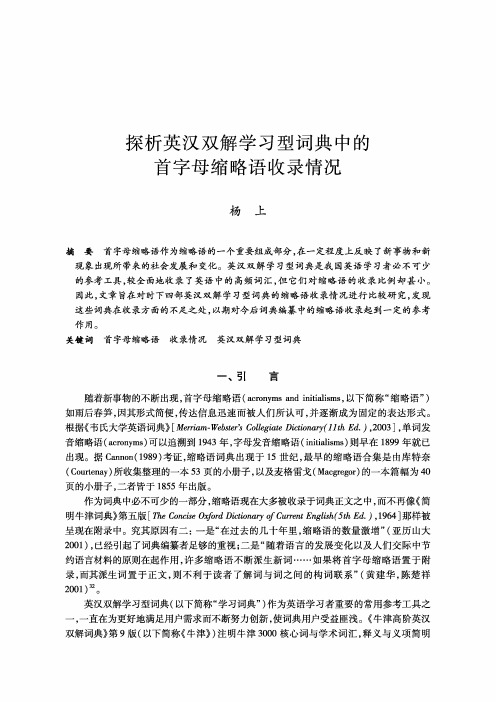
探析英汉双解学习型词典中的首字母缩略语收录情况杨上摘要首字母缩略语作为缩略语的一个重要组成部分,在一定程度上反映了新事物和新现象出现所带来的社会发展和变化。
英汉双解学习型词典是我国英语学习者必不可少的参考工具,较全面地收录了英语中的高频词汇,但它们对缩略语的收录比例却甚小。
因此,文章旨在对时下四部英汉双解学习型词典的缩略语收录情况进行比较研究,发现这些词典在收录方面的不足之处,以期对今后词典编纂中的缩略语收录起到一定的参考作用。
关键词首字母缩略语收录情况英汉双解学习型词典—、弓[言随着新事物的不断出现,首字母缩略语(acronyms and initialisms,以下简称"缩略语")如雨后春笋,因其形式简便,传达信息迅速而被人们所认可,并逐渐成为固定的表达形式。
根据《韦氏大学英语词典》[Merriam-Webster's Collegiate Dictionary(11th Ed.),2003],单词发音缩略语(acronyms)可以追溯到1943年,字母发音缩略语(inilialisms)则早在1899年就已出现。
据CaimondgSg)考证,缩略语词典出现于15世纪,最早的缩略语合集是由库特奈(Courtenay)所收集整理的一本53页的小册子,以及麦格雷戈(Macgregor)的一本篇幅为40页的小册子,二者皆于1855年出版。
作为词典中必不可少的一部分,缩略语现在大多被收录于词典正文之中,而不再像《简明牛津词典》第五版[The Concise Oxford Dictionary of Current English(5th Ed.),1964]那样被呈现在附录中。
究其原因有二:一是“在过去的几十年里,缩略语的数量激增”(亚历山大2001),已经引起了词典编纂者足够的重视;二是“随着语言的发展变化以及人们交际中节约语言材料的原则在起作用,许多缩略语不断派生新词……如果将首字母缩略语置于附录,而其派生词置于正文,则不利于读者了解词与词之间的构词联系”(黄建华,陈楚祥2001)32o英汉双解学习型词典(以下简称“学习词典”)作为英语学习者重要的常用参考工具之一,一直在为更好地满足用户需求而不断努力创新,使词典用户受益匪浅。
牛津英汉双解大词典The New Oxford Dictionary of English(Y)
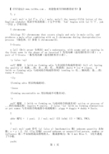
从《牛津高阶英汉双解词典》第四版与第六版释义与注释的比较看词典发展的变迁
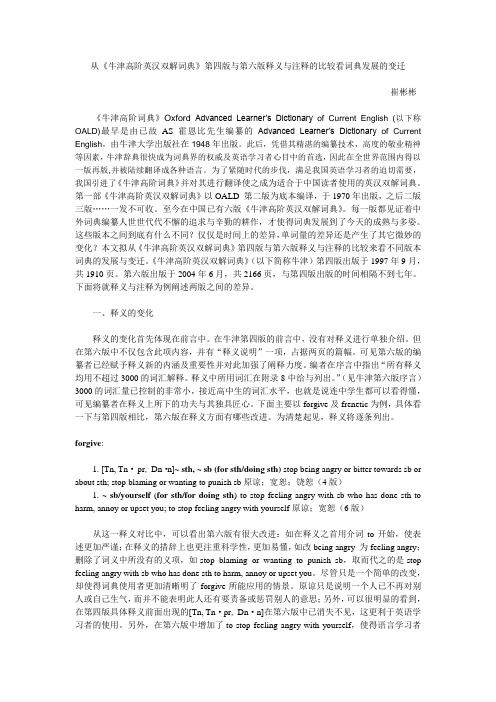
从《牛津高阶英汉双解词典》第四版与第六版释义与注释的比较看词典发展的变迁崔彬彬《牛津高阶词典》Oxford Advanced Learner’s Dictionary of Current English (以下称OALD)最早是由已故AS霍恩比先生编纂的Advanced Learner’s Dictionary of Current English,由牛津大学出版社在1948年出版。
此后,凭借其精湛的编纂技术,高度的敬业精神等因素,牛津辞典很快成为词典界的权威及英语学习者心目中的首选,因此在全世界范围内得以一版再版,并被陆续翻译成各种语言。
为了紧随时代的步伐,满足我国英语学习者的迫切需要,我国引进了《牛津高阶词典》并对其进行翻译使之成为适合于中国读者使用的英汉双解词典。
第一部《牛津高阶英汉双解词典》以OALD 第二版为底本编译,于1970年出版,之后二版三版……一发不可收。
至今在中国已有六版《牛津高阶英汉双解词典》。
每一版都见证着中外词典编纂人世世代代不懈的追求与辛勤的耕作,才使得词典发展到了今天的成熟与多姿。
这些版本之间到底有什么不同?仅仅是时间上的差异,单词量的差异还是产生了其它微妙的变化?本文拟从《牛津高阶英汉双解词典》第四版与第六版释义与注释的比较来看不同版本词典的发展与变迁。
《牛津高阶英汉双解词典》(以下简称牛津)第四版出版于1997年9月,共1910页。
第六版出版于2004年6月,共2166页,与第四版出版的时间相隔不到七年。
下面将就释义与注释为例阐述两版之间的差异。
一、释义的变化释义的变化首先体现在前言中。
在牛津第四版的前言中,没有对释义进行单独介绍。
但在第六版中不仅包含此项内容,并有“释义说明”一项,占据两页的篇幅。
可见第六版的编纂者已经赋予释义新的内涵及重要性并对此加强了阐释力度。
编者在序言中指出“所有释义均用不超过3000的词汇解释。
释义中所用词汇在附录8中给与列出。
”(见牛津第六版序言)3000的词汇量已控制的非常小,接近高中生的词汇水平,也就是说连中学生都可以看得懂,可见编纂者在释义上所下的功夫与其独具匠心。
牛津双阶英语词典
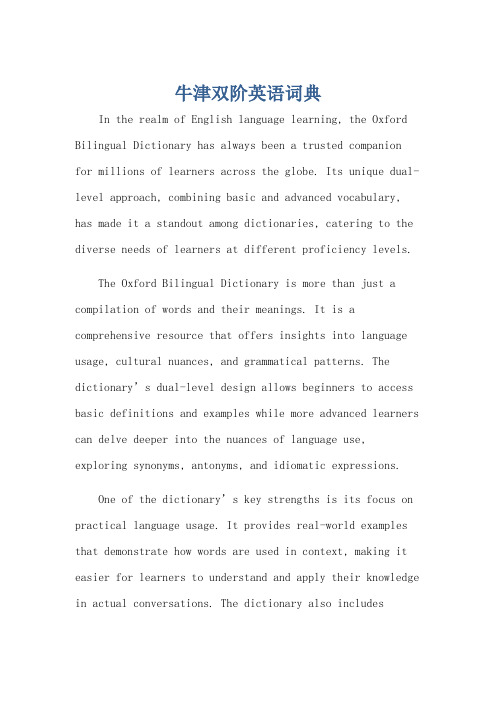
牛津双阶英语词典In the realm of English language learning, the Oxford Bilingual Dictionary has always been a trusted companionfor millions of learners across the globe. Its unique dual-level approach, combining basic and advanced vocabulary, has made it a standout among dictionaries, catering to the diverse needs of learners at different proficiency levels. The Oxford Bilingual Dictionary is more than just a compilation of words and their meanings. It is a comprehensive resource that offers insights into language usage, cultural nuances, and grammatical patterns. The dictionary’s dual-level design allows beginners to access basic definitions and examples while more advanced learners can delve deeper into the nuances of language use, exploring synonyms, antonyms, and idiomatic expressions.One of the dictionary’s key strengths is its focus on practical language usage. It provides real-world examples that demonstrate how words are used in context, making it easier for learners to understand and apply their knowledge in actual conversations. The dictionary also includespronunciation guides, which are invaluable for learners who are striving to perfect their pronunciation skills.Moreover, the Oxford Bilingual Dictionary is regularly updated to reflect the latest developments in English language and culture. This ensures that learners have access to the most relevant and up-to-date information, enabling them to keep up with the evolving nature of the language.For learners who prefer digital resources, the Oxford Bilingual Dictionary is also available in electronic formats, such as mobile apps and online versions. These digital versions offer additional features like search functionality, voice recognition, and personalized learning tools, making it even more convenient for learners to access and use the dictionary.The versatility of the Oxford Bilingual Dictionary is another noteworthy aspect. It can be used by students preparing for exams, professionals seeking to enhance their vocabulary for work-related purposes, or even casual learners interested in exploring the richness of the English language. Its wide appeal is further reflected inthe fact that it is available in multiple languages,catering to the needs of learners from diverse linguistic backgrounds.In conclusion, the Oxford Bilingual Dictionary is a powerful tool that can greatly enhance the English language learning experience. Its dual-level approach, comprehensive coverage, and focus on practical usage make it an indispensable resource for learners at all levels. Whether you are a beginner or an advanced learner, the Oxford Bilingual Dictionary will be your loyal companion in your journey of exploring and mastering the English language.**牛津双阶英语词典:英语学习者的得力助手**在英语学习领域,牛津双阶英语词典一直是全球数百万学习者的信赖之选。
- 1、下载文档前请自行甄别文档内容的完整性,平台不提供额外的编辑、内容补充、找答案等附加服务。
- 2、"仅部分预览"的文档,不可在线预览部分如存在完整性等问题,可反馈申请退款(可完整预览的文档不适用该条件!)。
- 3、如文档侵犯您的权益,请联系客服反馈,我们会尽快为您处理(人工客服工作时间:9:00-18:30)。
zanily
adv.
zaniness
n.
zany
n comical or eccentric person 滑稽的或古怪的人.
zap
/ zAp; zAp/ v (-pp-) (infml 口) 1 [Tn, Tn.pr] ~ sb (with sth) (a) kill sb, esp with a gun 杀死某人(尤指用枪). (b) make sb unconscious with a hit, blow, etc; attack sb 将某人打昏; 攻击某人. 2 [Ipr, Ip] move suddenly or quickly in the specified direction (沿某方向)突然或迅速移动: Have you seen him zapping around town on his new motor bike? 你看见没看见他骑著自己的新摩托车在市区飞驰?
zealously
adv.
zealot
/ 5zelEt; `zZlEt/ n (sometimes derog 有时作贬义) person who is extremely enthusiastic about sth, esp religion or politics; fanatic (对某事物, 尤指宗教或政治)极热心的人; 狂热者.
zappy
adj (infml 口) lively and energetic; amusing 活泼的; 精力旺盛的; 好笑的.
zeal
/ zi:l; zil/ n [U] (fml 文) ~ (for sth) (usu intense) energy or enthusiasm; keenness (通常为高度的)热忱, 热情; 热心: show zeal for a cause 表现出对一事业的热忱 * work with great zeal 热情洋溢地工作 * revolutionary, religious zeal 革命的、 宗教的热诚.
zero-rated
adj (of goods, services, etc) on which no value added tax is charged (指货物、 服务等)免付增值税的.
zest
/ zest; zZst/ n [U, sing] 1 ~ (for sth) great enjoyment or excitement; gusto 极大的快乐或兴奋; 热情; 兴趣: Her zest for life is as great as ever. 她对生活的极大乐趣一如既往. * He entered into our plans withterrific zest. 他满腔热情地参加了我们的项目. 2 (qualityof) having added interest, flavour, charm, etc 增加的兴 趣、 风味、 魅力等(的性质): The element of risk gave (an) added zest to the adventure. 这种冒险成分更给探险活动平添几分乐趣. 3 outer skin of oranges, lemons, etc when used as a flavouring in cooking (用於烹饪时调味的)橙子、 柠檬等的外皮. Cf 参看 peeln, rind, skin4.
Zen
/ zen; zZn/ n [U] Japanese form of Buddhism that stresses the importance of meditation more than the reading of religious writings 禅, 禅宗(日本佛教宗派, 注重静坐沉思而并非诵读经文): [attrib 作定语] Zen Buddhism 禅宗佛教.
zebra crossing
(Brit) part of a road, marked with broad white stripes, where vehicles must stop if pedestrians wish to cross 斑马线(用白色宽条标出的路面部分, 行人欲通过时车辆必须停止). =>illus 见插图. Cf 参看 pedestrian crossing (pedestrian), pelican crossing (pelican).
zany
/ 5zeInI; `zenI/ adj (-ier, -iest) (infml 口) amusingly ridiculous; eccentric 滑稽可笑的; 古怪的: a zany haircut, lifestyle, personality 滑稽古怪的发型、 生活方式、 性格.
zealous
/ 5zelEs; `zZlEs/ adj full of zeal; eager 热情的; 热心的; 积极的: zealous for liberty and freedom 为争取自由而积极的 * zealous to succeed at work 一心要做好工作.
zap
n [U] (infml 口) feeling of energy, liveliness, etc; vigour 精力; 活力; 元气: I really admire her she's so full of zap! 我真佩服她--精力那麽充沛! Cf 参看 zip2.
zed
/ zed; zZd/ (US zee / zi:; zi/) n the letter Z Z字母: There are two zeds in `puzzle'. 在 puzzle 一字中有两个 z 字母.
Zeitgeist
/ 5zaItgaIst; `zaIt9^aIst/ n (German 德) spirit of a particular period of history as shown by the ideas, beliefs, etc of the time 时代精神.
zero
/ 5zIErEU; `zIro/ pron, det 1 0; one less than one; nought 0; 零: Five, four, three, two, one, zero. We have lift-off! 五、 四、 三、 二、 一、 零. 我们升空了! 2 lowest point; nothing; nil 最低点; 没有; 无: Economic growth is at zero, ie is not increasing. 经济无增长. * Prospects of success in the talks were put at zero. 会谈没有成功的希望. 3 (a) point between plus (+) and minus () on a scale, esp on a thermometer (刻度上的)零点, 零位; (尤指温度计的)零度: The thermometer fell to zero lastnight. 昨夜温度计显示气温下降到零度. (b) temperature,pressure, etc that corresponds to zero on a scale (相当於零度的)温度、 压力等: It was really cold last night ten degrees below zero, ie 10C, ten degrees belowthe freezing point of water. 昨夜真冷--零下十度(10C). =>Usage at nought 用法见nought. 4 (infml 口 esp US) nothing at all; none 毫无; 没有: Politics has zero interest for me, ie I am not at all interested in it. 我对政治丝毫不感兴趣.
zero
n (pl ~s) the number 0 *0; 零; 零号.
zero
v (phr v) zero in on sb/sth 1 aim guns, etc at or find the range of (a particular target) (将枪炮等)瞄准(某目标)或调整到(某目标的)射程. 2 (fig 比喻) fix attention on sb/sth; focus on sb/sth 将注意力集中於某人[某事物]; 将焦点调到某人[某事物]上: zero in on the key issues for discussion 把注意力集中到讨论的关键问题上来.
zealotry
/ -rI; -rI/ n [U] (fml 文) zealous attitude or behaviour 极热心的态度或行为.
zebra
/ 5zebrE, 5zi:brE; `zibrE/ n (pl unchanged or ~s 复数或不变或作 zebras) African wild animal of the horse family with a body covered by black (or dark brown) and white stripes 斑马.
【《TXT论坛》 , 欢迎您来TXTBBS推荐好书!】
Z, z
/ zed; ?@ zi:; zi/ n (pl Z's, z's / zedz; ?@ zi:z; ziz/)1 the twenty-sixth and last letter of the English alphabet; zed 英语字母表的第二十六个也是最後一个字母.2 (idm 习语) from A to Z => A, a1.
